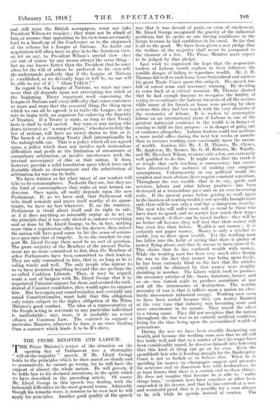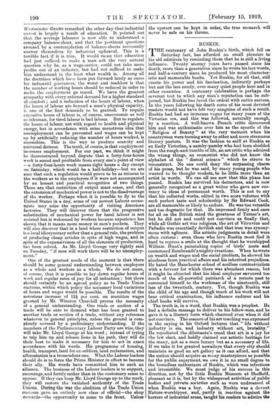THE PRIME MINISTER AND LABOUR.
THE Prime Minister's review of the situation on the
opening day of Parliament was a thoroughly " will-of-the-majority " speech. If Mr. Lloyd George holds to the principles which he then stated so clearly and so persuasively, he cannot go wrong, for be will have the support of almost the whole nation. He will govern, if he holds fast to his declared intentions, in the spirit which we have described in the preceding article. Of course Mr. Lloyd George in this speech was dealing with the industrial difficulties in the most general terms: Admirable though his remarks were,. it remains to be seen how he will
apply his principles. Another good quality of the speech to be rich while he spends. Instead of creates. Tho
was that it was devoid of panic, or even of excitement. Mr. Lloyd George recognized the gravity of the industrial problems, but he spoke as one having confidence in the future because he had confidence in his creed. So far that is all to the good. We have been given a new pledge that the welfare of the majority shall never be postponed to the clamour of a few. The Prime Minister must expect to be judged by that pledge.
Last week we expressed the hope that the responsible leaders of Labour would explain to their followers the terrible danger of failing to reproduce wealth. Mr. .T. H.
Thomas did well to rush home from Switzerland and address his great Trade Union' upon this subject. Ills speech was
full of sound sense and necessary warning. By deciding
to come back at a critical moment, Mr. Thomas showed that he had enough humour to recognize the futility of trying to co-ordinate the Labour interests of all the nations while many of his friends at home were proving by their actions that they had lost touch with the very elements of the economics of labour. It is useless to systematize labour on an international plane if Labour in one of the greatest industrial countries in the world is in danger of ceasing to fulfil its that purpose—is in danger of going out of existence altogether: Labour leaders could not perform a more useful office during the next few weeks or months than to instruct working men continually upon the nature of wealth. Leaders like Mr. J. II. Thomas, Mr. Clynes, Mr. Appleton, Mr. Barnes, 14r. G. H. Roberts, Mr. Wardle, and Mr. Havelock Wilson, to name only a few, are extremely well qualified to do this. It might seem that the truth is so simple that such teaching is unnecessary, but events have illustrated the rashness of making any sanguine assumptions. Unfortunately in our political world the simplest and most obvious facts require constant repetition. Throughout the war wealth—that is to say, goods and services, labour and what labour produces—has been destroyed at a tremendous pace and on an ever-increasing scale. If the present pause before getting to work again in the business of creating wealth is not speedily brought to an end, there will be not only a real but a dangerous scarcity. The men who will suffer most will as usual be those who have least to spend, and no matter how much their wages may be raised—if these can be raised further—they will be no better off because they will find that their money will buy even less than before. Wealth is not money ; it is certainly not paper money. Money is only a symbol to enable you to draw upon wealth. Yet the working man has fallen into the habit of saying that there is plenty of money flying about, and that he means to have more of it. This shows that he has confused wealth with money. While the working man has been very much alive during the war to the fact that money was being spent freely, he has been curiously blind to the fact that the articles which could be obtained by that money were steadily shrinking in number. The labour which used to produce the necessary articles of life—boots, furniture, houses, and so on—was turned aside to produce munitions of war and all the instruments of destruction. The terrible necessity of war is that it inflicts upon a nation an abso- lutely uneconomic industrial energy. Working men seem to have been misled because they raw money flaunted at the very time that industry was becoming more and more uneconomic in its nature. They traced the effect to a wrong cause. They did not recognize that the nation throughout the war was in an entirely artificial condition, living for the time being upon the accumulated wealth of generations. During the war we have been steadily dissipating our wealth, and because the working man sees that we all still live fairly well, and that as a matter of fact his wages have been considerably raised, he deceives himself into believing that this kind of thing can go on for ever. Even the spendthrift heir who is heading straight for the Bankruptcy Court is not so foolish as to believe this. When he Is spending his money on champagne suppers and presents for actresses and on disastrous bets with bookmakers, he at least knows that there is a certain end to these things. He does not imagine that because he is able to " make
things hum," economic laws have somehow or other been suspended in his favour, and that he has arrived at a new and wonderful proof that it is possible for a man always IVestmineter Gazette remarked the other day that industrial unrest is largely a result of education. It pointed out that the average labourer is now able to understand a company balance-sheet, and that the pertinent questions aroused by a contemplation of balance-sheets necessarily answer themselves by industrial upheaval. This is a terrible fact if it is true. It would mean that education had just sufficed to make a man ask the very natural question why he, as a wage-earner, could not take more profits out of an industry, but had not sufficed to make him understand in the least what wealth is. Among all the doctrines which have been put forward lately as cures for industrial grievances, the worst and maddest is that the number of working hours should be reduced in order to make the employment go round. We have the greatest sympathy with every rational demand for a higher standard of comfort ; and a reduction of the hours of labour, when the hours of labour ate beyond a man's physical capacity, is one of the first demands to be granted. To require excessive hours of labour is, of course, uneconomic as well as inhuman, for tired labour is bad labour. But to regulate the hours of labour, not with regard to health and physical energy, but in accordance with some monstrous idea that unemployment can be prevented and wages can be kept up by artificially reducing the number of hours worked, is moonshine. This is the way to produce scarcity and universal distress. The truth, of course, is that employment increases employment. For our part, we think it might be demonstrated beyond dispute that a forty-four-hours week is sound and profitable from every one's point of view —a forty-four-hours week means eight hours a day except on Saturday, which would be a half-holiday—but we are sure that such a regulation would prove to be as ruinous to the workers as to the employers if it were not accompanied by an honest and practical recognition of two things. These are that restriction of output must cease, and that the extension of mechanical power is not to the disadvantage of the worker. Perhaps when it is possible to fly to the United States in a day, some of our newest Labour econo- mists may seize the opportunity of visiting American factories. They will discover there that the progressive substitution of mechanical power for hand labour is not resisted but is welcomed by workers because experience has shown that it means more money in men's pockets. They will also discover that in a land where restriction of output is a local idiosyncrasy rather than a general rule, the problem of producing cheap articles in spite of high wages, and in spite of the expensiveness of all the elements of production, has been solved. As Mr. Lloyd George very rightly said on Tuesday, " if men will work there will be no unemploy- ment."
One of the greatest needs of the moment is that there should be some general understanding between employers as a whole and workers as a whole. We do not mean, of course, that it is possible to lay down regular hours of work and regular rates of pay for all industries ; but there should certainly be an agreed policy as to Trade Union customs, within which policy the necessary local variations of hours and wages would be possible. The results of the notorious increase of 125 per cent. on munition wages granted by Mr. Winston Churchill proves the necessity of a general understanding. One trade or section of a trade will be sure to demand what has been granted to another trade or section of a trade, without any reference whatever to general principles, unless the ground is com- pletely covered by a preliminary understanding. If the members of the Parliamentary Labour Party are wise, they will take Mr. Lloyd George at his word ; instead of trying to trip him up and release lions in his path, they will do their best to make it necessary for him to act in exact accordance with his words. His programme of housing, health, transport, land for ex-soldiers, land reclamation, and afforestation is a tremendous one. What the Labour leaders should do is to force the Prime Minister in effect to become their ally. His words have committed him to such an alliance. The business of the Labour leaders is to support, encourage, and fortifyrather than in the customary sense to oppose. If they can keep Mr. Lloyd George up to the mark, they will restore the vanished authority of the Trade Unions. During the war the abolition of the Trade Union customs gave an entirely new class of official—the shop stewards—the opportunity to come to the front. Unless
the upstart can be kept in order, the true monarch will never be safe on his throne.



































 Previous page
Previous page